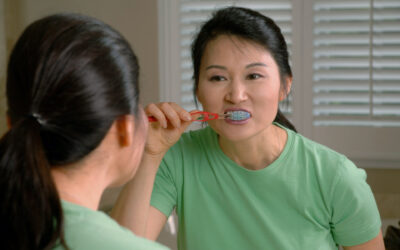According to the American Dental Association (ADA), the toothbrush has been around for nearly 5,000 years. ‘Chew sticks’ of bone, wood, ivory, and hog bristles all were used in the past to clean teeth, and the nylon bristled toothbrush that we now use wasn’t invented until 1938.
We’re taught that using a toothbrush regularly is one of the best ways to keep our teeth and gums healthy. But stores carry such a huge variety of toothbrushes, both manual and powered, that it’s hard to determine what kind of toothbrush is best.
Fortunately, the ADA reassures us that both manual and powered toothbrushes can effectively and thoroughly clean teeth, as long as you brush your teeth on a regular basis and use good technique (see our article on Home Dental Care for tips on brushing correctly).
People who have difficulty using a manual toothbrush, though, such as the elderly or physically disabled, may simply find a powered toothbrush easier or more comfortable to use because less power is needed for brushing.
There are certain things that you should look for in a toothbrush, however, whether it is manual or powered:
Size
The best toothbrush head should allow you to clean all the surfaces of your teeth easily. For most adults, a smaller brush head of about a half-inch wide and one-inch long is the easiest to use and the most effective.
Though there are larger toothbrush heads available, they are more difficult to maneuver in order to clean hard-to-reach areas, such as the sides and backs of your molars.
A toothbrush should also have a long enough handle so you can comfortably hold it in your hand.
Bristle Type
Both manual and powered toothbrushes offer brushes with soft, medium, or hard nylon bristles. For the vast majority of people, a soft-bristled toothbrush is the most comfortable and safest choice.
Depending on how vigorously you brush your teeth and the strength of your teeth, medium- and hard-bristled brushes can actually damage the gums, root surface, and tooth enamel.
You should also check that the bristles on the toothbrush you select have rounded tips.
If you wear braces, you’ll find toothbrushes on the market designed to remove food and plaque around the brackets. These types of brushes are specially angled for the bristles to go inside the braces.
Expert Recommendation
To ensure that your toothbrush has undergone rigorous quality control tests for cleaning effectiveness and safety, look for the American Dental Association (ADA) Seal of Approval.
This seal ensures that the bristles have safe tips and will not fall out of the toothbrush under typical brushing conditions; that the handle will withstand normal use; and that the toothbrush, used properly, will effectively reduce plaque build-up and gum disease in its early stages.
In addition, toothbrushes bearing the Seal also must undergo safety testing in an independent lab and prove through clinical trials that the toothbrush is safe for use on the tissues of the mouth and teeth, as well as on any dental hardware that may be in place.
No matter what type of toothbrush you choose, the American Dental Association recommends that you brush twice a day with a fluoride toothpaste and clean between your teeth with floss or an interdental cleaner daily.
It’s also important to keep your toothbrush clean:
- Rinse your toothbrush with tap water after brushing to remove any remaining toothpaste and debris.
- Store the brush in an upright position if possible and allow it to air dry until using it again.
- Do not routinely cover toothbrushes or store them in closed containers. A moist environment, such as a closed container, will grow more microorganisms than the open air.
- Make sure you replace your toothbrush every three to four months. Bristles that become frayed and worn with use will be less effective at cleaning teeth.
If you are in the Fort Smith area and would like to talk with a dentist about what type of toothbrush is best for your needs, feel free to call our office at 479-452-1738 or use our Contact form to make an appointment today!



